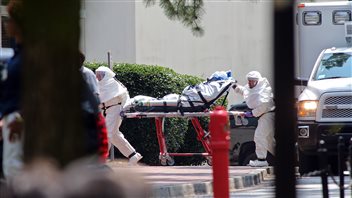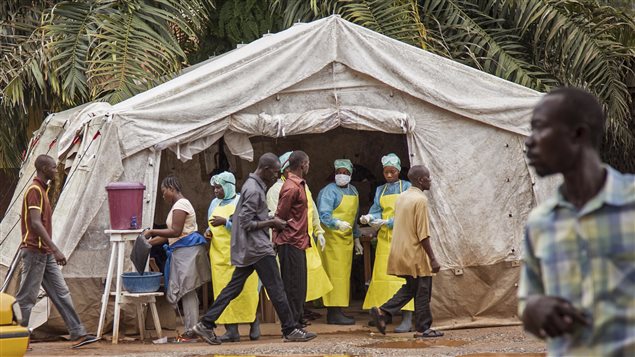Experts from around the world held a telephone conference to discuss ethical issues around the growing Ebola outbreak in West Africa. Among the issues is the use of therapies not yet proven to be safe or effective in humans. Some studies have been done on primates but there have not been clinical trials on humans.
Who should get drugs?
The experimental drug Zmapp was given to two U.S. aid workers and Spanish missionary priest. Some Africans says it is unfair that only three westerners have received the drug while most of the people with Ebola are African. Scientists argue the drug had to be carefully administered and its effects closely monitored.
Canadian researchers contributed to the development of Zmapp, but only small quantities are available. So if experts were to determine it was ethical to administer the experimental drug, the question of who should get it, becomes more acute.
ListenHealth care workers appear to be at particular risk of catching Ebola. “Because they take the risk, out of reciprocity at least, we think that it’s probably morally justifiable to offer it to health workers in the first place,” says Lisa Schwartz, an ethicist at McMaster University in Hamilton, Ontario.“It’s both a reciprocity thing, but also because if they can get back to work, then they’re more likely to be able to care for other patients.” However she adds, once that decision is made it will be difficult to decide who else should have access to very limited aquantities of drugs.

‘Tragic choices …have to be made’
“Because the resources are scarce I think there will be tragic choices that have to be made,” says Schwartz. “I think they’ll probably focus it on the people who are most likely to be able to benefit from the treatment.
Sharing research is now faster
Past outbreaks of HIV and SARS have led to the adoption of more innovative ways to handle such situations, says Schwartz, such as ways to quicken the development of treatments. “We…saw the importance of data communication—sharing information across labs and across countries to ensure we could be quicker through sharing the burden rather than isolated labs trying to be the first to make the breakthrough.”
Pharmaceutical companies, she says, have not been doing much research on Ebola therapies because there is not much profit to be made. Schwartz thinks there are other than financial benefits for them and suggests they should take up the challenge of looking for ways to fight this deadly disease.
Ebola kills up to 90 per cent of those infected. At the time of this writing over 960 people have died in West Africa and the World Health Organization has declared the Ebola outbreak an international health emergency.







For reasons beyond our control, and for an undetermined period of time, our comment section is now closed. However, our social networks remain open to your contributions.